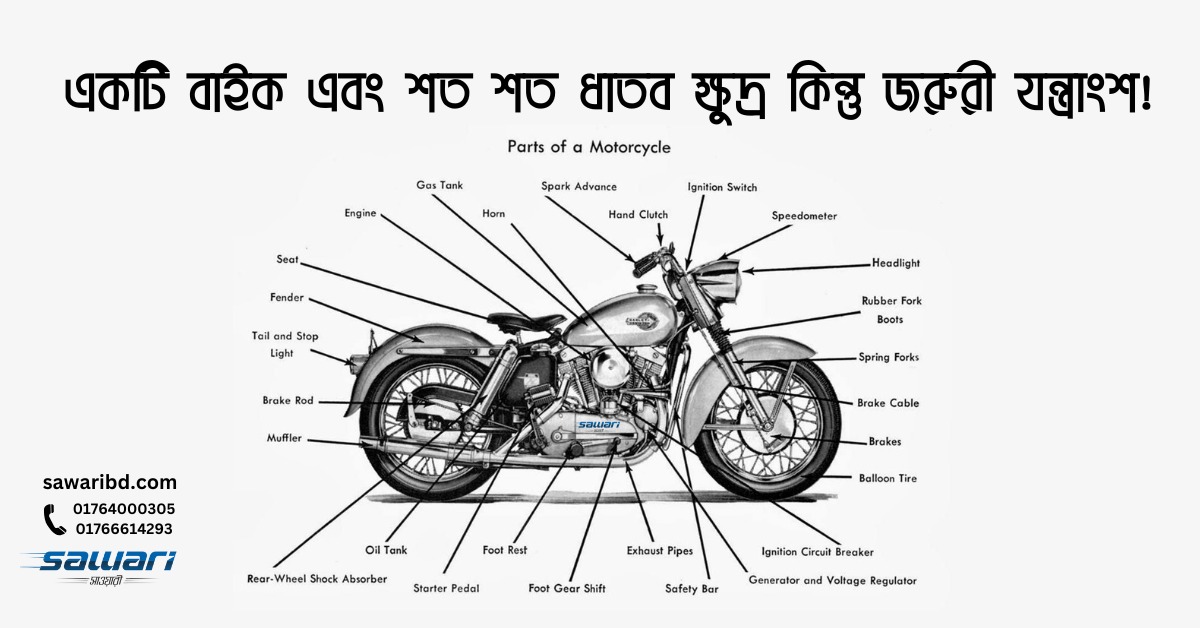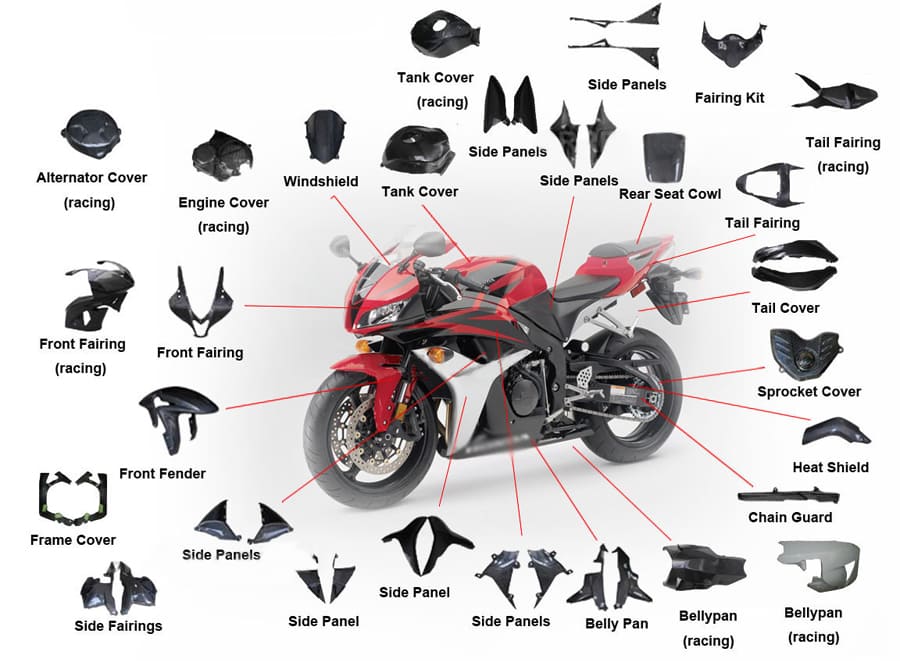Discover the Important Motorcycle Parts You Need for Ideal Performance
Recognizing the vital parts of a bike is basic for attaining peak performance. Each part, from the engine to the stopping system, plays an essential role in overall functionality and safety and security. Regular upkeep can protect against unexpected failures and enhance the riding experience. Several motorcyclists forget the details of these systems. Finding how they function with each other can result in a more effective adventure. What vital components should every motorcyclist focus on?
The Engine: The Heart of Your Bike
The engine works as the core component of a motorbike, driving its efficiency and defining its capacities. It is responsible for converting gas right into power, which powers the bike ahead. Different sorts of engines are used, including single-cylinder, V-twin, and inline configurations, each offering unique features matched for different riding functions and styles. The engine size, normally determined in cubic centimeters (cc), significantly affects performance, with bigger engines usually giving more power and torque.Furthermore, the engine's layout and technology, such as fuel injection systems or air-cooling versus liquid-cooling, impact performance and dependability. Upkeep is essential for peak procedure; variables like normal oil adjustments and checking ignition system assurance long life. Motorcyclists often think about an engine's responsiveness and level of smoothness, as these characteristics enhance the overall riding experience. Inevitably, the engine remains a vital component that specifies not only the motorbike's efficiency yet also the cyclist's connection to the equipment.
The Transmission: Changing Gears Efficiently
The transmission plays a vital function in a motorbike's performance, specifically in the mechanics of equipment shifting. Understanding just how to shift equipments efficiently can boost the overall riding experience, while routine upkeep guarantees peak functionality. Proper focus to these facets can greatly influence the longevity and performance of the motorbike.

Equipment Shifting Mechanics
Smooth gear moving is vital for excellent motorbike performance, considerably impacting both acceleration and control. The technicians of gear shifting involve the communication in between the clutch, gear lever, and transmission system. When a rider involves the clutch, it disengages the engine from the transmission, enabling a gear change without damaging the components. A well-timed launch of the clutch, incorporated with specific movement of the equipment bar, promotes a seamless change in between gears. This procedure assures that the engine operates within its ideal power band, enhancing performance. Oem Parts New Zealand. Additionally, understanding the gear ratios and their result on rate and torque can aid cyclists make notified selections throughout shifts, ultimately adding to a more pleasurable and responsive riding experience
Maintenance Tips Significance
Routine maintenance plays a vital duty in assuring that the transmission system operates efficiently, permitting smooth gear shifts. Routinely altering the transmission and checking liquid is crucial, as old liquid can bring about raised friction and wear. In addition, evaluating the clutch for wear warranties peak engagement and disengagement, stopping slippage during equipment adjustments. Lubrication of moving parts is equally important to decrease friction and improve efficiency. Bike proprietors need to also keep an eye on for leaks and unusual sounds, as these can indicate underlying concerns. By adhering to these upkeep tips, cyclists can lengthen the life expectancy of their transmission system, guaranteeing that equipment changes remain smooth and adding to the general performance of their motorcycle.
The Braking System: Ensuring Safety on Every Ride
Braking systems are fundamental elements that straight affect a motorcycle's safety and security and efficiency. They consist of various components, including brake pads, rotors, calipers, and hydraulic lines, all working together to ensure reliable slowdown. The sort of braking system-- usually either disc or drum-- impacts responsiveness and stopping power.Regular upkeep is important to support peak performance; used brake pads can result in lowered effectiveness and increased stopping ranges. Additionally, the quality of brake fluid should be monitored, as it can take in moisture in time, compromising stopping efficiency.Riders ought to additionally take into consideration the value of anti-lock braking systems (ABDOMINAL), which protect against wheel lockup during abrupt stops, improving general safety and security. Properly functioning brakes are not simply concerning stopping; they impart self-confidence in the motorcyclist, allowing for more secure navigation with numerous terrains. Eventually, a reputable stopping system is critical for appreciating every trip with satisfaction.
The Suspension: Enhancing Convenience and Control
A well-functioning suspension system substantially adds to a motorbike's total efficiency, complementing the performance of the braking system. The suspension plays a considerable duty in absorbing shocks from uneven surfaces, guaranteeing a smoother adventure while preserving tire call with the roadway. This call is essential for both security and control, enabling cyclists to navigate corners with confidence and precision.Different sorts of shock absorber, such as telescopic forks or mono-shocks, use varying degrees of convenience and handling. Properly tuned suspension improves responsiveness, providing the rider with an extra connected feel to the motorcycle. Normal maintenance checks are very important to determine the suspension components, consisting of dampers and springs, are functioning at their ideal. An effective suspension system not just elevates the riding experience however also adds to the durability of various other motorcycle parts by decreasing wear and tear. Because of this, spending in quality suspension is essential for any type of serious motorcycle lover.
The Tires: Linking You to the Road
Tires play a necessary role in a motorcycle's efficiency, serving as the main web link in between the road and the biker. Understanding the various kinds of tires readily available can significantly influence managing and safety and security. Additionally, regular upkeep is essential to ensure peak tire efficiency and longevity.
Tire Enters Explained
How do various tire kinds influence a motorbike's efficiency? Tire types play a crucial duty in establishing a motorbike's security, handling, and grasp. Sport tires, made for high efficiency, offer improved traction and responsiveness on smooth roads, making them ideal for racing and aggressive riding. On the other hand, visiting tires focus on resilience and convenience, providing a smoother trip for long-distance travel. Off-road tires, defined by their rugged walk patterns, master grip on unpaved surfaces, appropriate for experience lovers. In addition, dual-sport tires mix features from both off-road and on-road categories, accommodating versatile riding needs. Ultimately, selecting the appropriate tire type is vital for enhancing performance, making sure security, and boosting the general riding experience.
Upkeep Tips Offered
While riding when driving, preserving suitable tire condition is crucial for safety and security and efficiency. Consistently inspecting tire stress is important, as under-inflated tires can lead to poor handling and increased wear. It is advisable to evaluate step deepness often; worn tires concession hold and stability. In addition, riders must seek indications of damage, such as splits or lumps, which can show the requirement for replacement. Revolving tires periodically ensures even put on, improving longevity. Furthermore, maintaining tires clean from particles and staying clear of too much aesthetics can lengthen their lifespan. Preserving proper positioning and equilibrium contributes to come to a head performance, lessening stress and anxiety on various other bike elements. Complying with these maintenance suggestions will significantly boost the total riding experience.
The Fuel System: Fueling Performance and Efficiency
The gas system plays an essential role in optimizing a motorbike's performance and performance, as it guarantees the optimal delivery of gas to the engine. It consists of numerous crucial elements, including the gas storage tank, gas pump, fuel filter, and fuel injectors or carburetor. Each part must work properly to assure a effective and smooth ride.The fuel tank stores gas and provides it to the engine via the gas pump, which produces the essential stress. A gas filter avoids impurities discover here from getting in the engine, while the injectors or carburetor mix gas with air for combustion.Proper upkeep of the fuel system is important; a clogged up filter or malfunctioning injector can lead to decreased performance and boosted More hints gas usage. By validating that the fuel system runs successfully, cyclists can take pleasure in better throttle feedback, far better gas economy, and in general improved riding experience.
The Electrical System: Powering Your Trip
An efficient electrical system is important for the overall performance and safety and security of a motorbike, as it powers vital elements such as the ignition, lights, and various electronic systems. This system consists of the battery, which stores power, and the generator, liable for generating power while the engine runs. The circuitry harness attaches these elements, making sure dependable power distribution.Additionally, fuses protect the system from overloads, while relays help control high-current tools with low-power signals. A well-kept electrical system enhances performance by making sure smooth starts and regular procedure of signals and lights, important for rider exposure and safety.Regular checks of the battery's charge and links are very important for preventing electric failings. Riders need to likewise inspect circuitry for damage, making certain all elements function ideally. Ultimately, a robust electric system contributes substantially to the general performance and reliability of the motorcycle.
Frequently Asked Questions
Just how Typically Should I Replace My Motorcycle's Battery?
The regularity of motorbike battery substitute relies on usage and maintenance (Bike Parts Wellington). Usually, batteries ought to be replaced every 3 to 5 years. Regular checks can assist determine when a substitute is required for peak performance
What Devices Do I Need for Basic Motorbike Maintenance?
For fundamental bike maintenance, one needs essential tools such as an outlet collection, wrenches, screwdrivers, pliers, tire stress gauge, and a torque wrench. These tools assist in reliable maintenance and assure the motorcycle runs effectively and safely.
Just How Can I Boost My Motorcycle's Aerodynamics?
To boost motorcycle the rules of aerodynamics, one ought to take into consideration readjusting fairings, utilizing windshield extensions, maximizing body setting, and minimizing overall weight. These adjustments aid decrease drag, boosting stability and gas performance throughout experiences.
What Are the Indications of a Failing Electric System?
Indications of a falling short electrical system consist of dimming lights, problem starting, irregular instrument readings, and blown fuses. Motorcycle Spares Christchurch. Unusual smells or deterioration around battery terminals might also suggest underlying issues needing prompt interest for safety and efficiency

Just how Do I Select the Right Oil for My Motorbike?
When choosing oil for a motorcycle, one must consider the manufacturer's specifications, viscosity ratings, and the type of riding. Furthermore, conventional versus artificial oil can influence efficiency and engine security, affecting the choice considerably. The engine dimension, normally measured in cubic centimeters (cc), considerably affects efficiency, with larger engines usually giving even more power and torque.Furthermore, the engine's style and modern technology, such as gas shot systems or air-cooling versus liquid-cooling, impact performance and integrity. A well-functioning suspension system considerably adds to a motorbike's overall performance, enhancing the efficiency of the braking system. The fuel system plays an important function in making best use of a motorbike's navigate to this site performance and efficiency, as it assures the optimal distribution of fuel to the engine. A fuel filter protects against contaminants from going into the engine, while the injectors or carburetor mix gas with air for combustion.Proper upkeep of the gas system is important; a blocked filter or malfunctioning injector can lead to lowered performance and boosted gas intake. A well-kept electric system enhances performance by ensuring smooth begins and consistent procedure of signals and lights, crucial for motorcyclist exposure and safety.Regular checks of the battery's cost and links are crucial for avoiding electric failures.
Comments on “Pro Tips About Choosing Quality Motorcycle Parts Auckland”